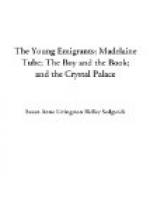He said he would take her to the apartment of the Superior, to which the traveller had been summoned on his return from the Archbishop, and there she could wait until he had time enough to speak with her about her son. When Frau Gensfleisch entered the room of the Superior, a crowd of monks was so gathered round the stranger that she could see neither his face nor form. He was opening out his wonderful volume, and the curious monks pressed eagerly round him. Loud and long were their exclamations of surprise as the book was opened, and page after page displayed. It was wonderful—it was marvellous—It was not like the work of hands, they said no scribe or copyist would write each letter so like another, and they said it must be done by magic, for that no mortal hands could write so wonderfully plain and exact and regular; and they questioned the stranger about his method of imprinting but he replied to all their questioning, “It is not magic, holy fathers, but it is patience which hath done it.”
Scarcely had these words been uttered, when catching the ear of Frau Gensfleisch, she started from her seat, and pushing aside the monks, who stood around the stranger, she made her way up to him, and she said, as she laid hold of his cloak and looked him in the face, “Stranger, what is thy name—what is thy true name? Is it not Hans Gensfleisch—wert thou not born here—art thou not my son?” And as she spoke she grasped eagerly both his hands.
The stranger paused, and a pang as if of sorrow seemed to pass across his brow, as he saw the weakness and infirmity of her who stood trembling before him. The years which had passed over his own head and had changed him from the slender youth into the strong and healthy man, had indeed laid a sore and heavy hand on her, who all this time had been left alone and unprotected, bowed down with sorrow and infirmity. He reproached himself for his long absence and neglect. Then falling on her neck, he embraced her long and tenderly, and he said, “Mother, I am indeed thy Hans!” and then turning to the wondering monks, “Yes, holy fathers, I am the Hans Gensfleisch, who was in this convent taught to read and write. When but a child, it was chance which first gave me the thought of thus imprinting books, but long years of patience and industry have been needed ere I could bring it to perfection.” Then to his mother, he said, “I will leave thee no more. Too much of my life has been passed away from thee—but now shalt thou have thy son again to cheer thy last days and to make thee happy.”
And happy indeed was Frau Gensfleisch, and she needed no promises from her son to assure her of the joy and comfort which his care would secure her for the few remaining years of her life. One thing alone displeased her, which was that he should have adopted a name different from that by which he had been known in childhood, but when he told her of the ridicule which had followed him wherever he went, when his strange




